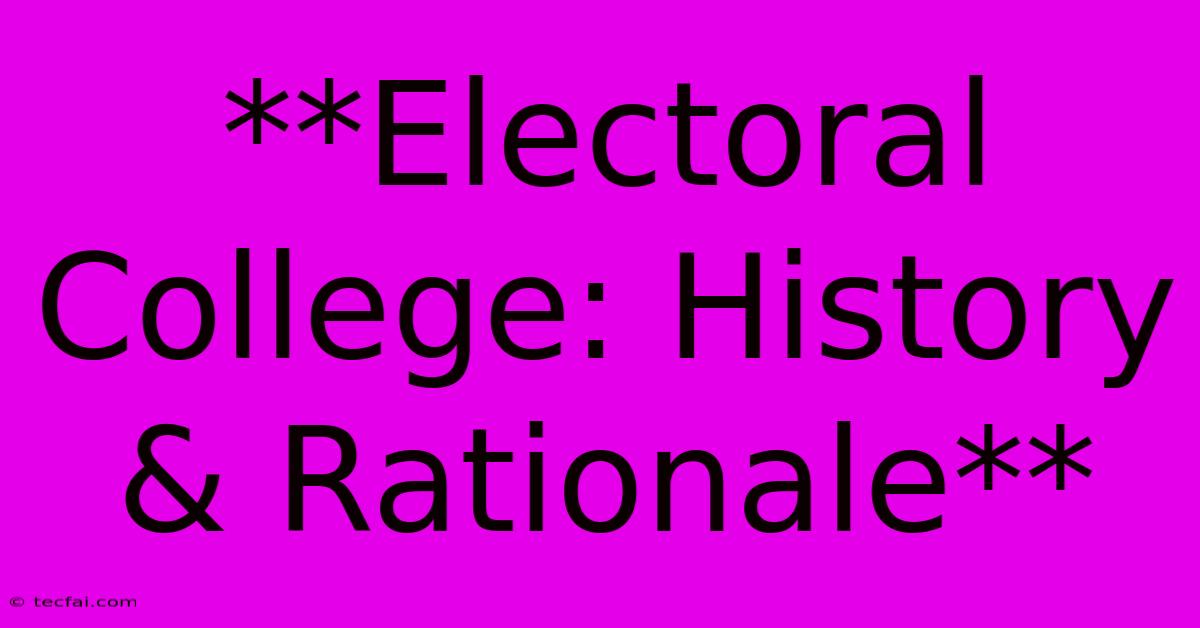**Electoral College: History & Rationale**

Discover more detailed and exciting information on our website. Click the link below to start your adventure: Visit Best Website tecfai.com. Don't miss out!
Table of Contents
Electoral College: History & Rationale
The Electoral College is a unique and often controversial aspect of the American presidential election process. While many understand its role in determining the President of the United States, its history and rationale are less widely known. This article delves into the origins of the Electoral College, exploring the reasons behind its creation and its enduring impact on American democracy.
The Founding Fathers' Dilemma
The Founding Fathers faced a significant challenge when establishing a system for electing the President. They recognized the dangers of a direct popular vote, particularly with a vast and diverse nation like the United States. They feared that:
- A powerful, centralized government could emerge: A direct popular vote might give undue influence to large states, potentially undermining the balance of power among the states.
- The majority could oppress the minority: Concerns existed about the influence of urban areas over rural populations, and the potential for the majority to disregard the interests of smaller states and minority groups.
- The public might lack sufficient knowledge to make informed decisions: The Founding Fathers believed that the electorate might be swayed by charismatic candidates or swayed by misinformation, leading to potentially unwise choices.
The Electoral College: A Compromise Solution
The Electoral College emerged as a compromise solution to address these concerns. The system aimed to:
- Balance the interests of large and small states: Each state is allocated a number of electors based on its combined population of Representatives and Senators in Congress. This ensures that smaller states retain a significant voice in the election.
- Protect against mob rule: By entrusting the selection of the President to a body of electors, the system sought to prevent the whims of the majority from overriding the interests of minorities.
- Facilitate a more informed process: The electors, chosen by each state, were expected to be knowledgeable individuals who could make a thoughtful decision about the best candidate for the presidency.
Rationale for Continued Use
Despite its critics, the Electoral College continues to be a key part of the US election system. Supporters argue that it:
- Protects the interests of less populous states: Smaller states have a greater influence in the Electoral College than in a direct popular vote, ensuring their interests are considered.
- Encourages candidates to campaign nationwide: By focusing on winning individual states, rather than just heavily populated areas, candidates are forced to appeal to a wider range of voters.
- Promotes a more stable system: The Electoral College provides a clear path to victory, reducing the likelihood of contested elections or prolonged uncertainty.
The Case for Reform
Opponents of the Electoral College point to several drawbacks:
- It undermines the principle of "one person, one vote": The Electoral College system can result in a candidate winning the presidency despite losing the popular vote, which can be seen as undemocratic.
- It creates a "winner-take-all" system: In many states, the candidate who wins the popular vote receives all of the state's electoral votes, regardless of the margin of victory. This can disenfranchise voters who support a different candidate.
- It can lead to voter suppression: The focus on winning key swing states can incentivize campaigns to target their efforts in specific areas, potentially neglecting the needs of voters in other parts of the country.
The Future of the Electoral College
The debate surrounding the Electoral College continues to be a highly contentious one. While there are strong arguments for both retaining and reforming the system, the future of the Electoral College remains uncertain. Discussions surrounding potential reforms often focus on:
- National popular vote initiatives: These initiatives seek to allocate all of a state's electoral votes to the candidate who wins the national popular vote, regardless of the state-level outcome.
- Proportional allocation of electoral votes: This reform would award electoral votes based on the proportion of the popular vote received by each candidate within a state, rather than a "winner-take-all" system.
The Electoral College is a complex system with a long and storied history. Its impact on the American political landscape continues to be debated, and its future remains a matter of ongoing discussion. Regardless of its eventual fate, understanding the Electoral College's origins and rationale is essential for comprehending the unique dynamics of American presidential elections.

Thank you for visiting our website wich cover about **Electoral College: History & Rationale**. We hope the information provided has been useful to you. Feel free to contact us if you have any questions or need further assistance. See you next time and dont miss to bookmark.
Featured Posts
-
Dollar Bond Yields Climb On Trump Election Win
Nov 06, 2024
-
Jobless Rate Rises To Near Four Year High
Nov 06, 2024
-
Paano Tinataya Ng Cnn Ang Halalan
Nov 06, 2024
-
New York Times Deploys Election Needle
Nov 06, 2024
-
Jill Steins Chances Against Kamala Harris
Nov 06, 2024
